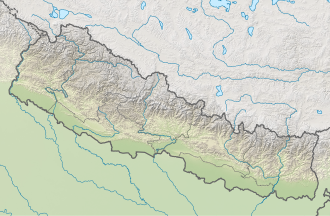Tsar Tse
| Tsar Tse | |
|---|---|
 East aspect centered on skyline | |
| Highest point | |
| Elevation | 6,398 m (20,991 ft)[1] |
| Prominence | 402 m (1,319 ft)[2] |
| Parent peak | Tashi Kang[2] |
| Isolation | 1.85 km (1.15 mi)[3] |
| Coordinates | 28°51′41″N 83°38′55″E / 28.86139°N 83.64861°E[1] |
| Geography | |
 | |
| Interactive map of Tsar Tse | |
| Country | Nepal |
| Province | Gandaki |
| District | Mustang |
| Protected area | Annapurna Conservation Area[2] |
| Parent range | Himalayas Mukut Himal[1] |
| Climbing | |
| First ascent | 2018 |
Tsar Tse, also spelled as Tsartse or Tasartse, is a mountain in Nepal.
Description
[edit]Tsar Tse is a 6,398-metre (20,991-foot) glaciated summit in the Nepalese Himalayas. It is situated 12 kilometres (7.5 mi) northwest of Jomsom in Gandaki Province and the Annapurna Conservation Area. Precipitation runoff from the mountain's slopes drains into tributaries of the Kali Gandaki. Topographic relief is significant as the summit rises 2,400 metres (7,874 ft) along the south slope in 3.5 kilometres (2.2 mi), and the north slope rises 2,800 metres (9,186 ft) in five kilometres (3.1 mi). The first ascent of the summit was made on September 25, 2018, via the southwest face by Koki Ikeda, Daisuke Shimozuru, Yujiro Suga, and Asahi Takeshita of Japan, with Dendi Sherpa, Ngima Sherpa, Penba Sherpa, Tenjin Sherpa, and Bir Kaji Tamang of Nepal.[4]
Climate
[edit]Based on the Köppen climate classification, Tsar Tse is located in a tundra climate zone with cold, snowy winters, and cool summers.[5] Weather systems are forced upwards by the Himalaya mountains (orographic lift), causing heavy precipitation in the form of rainfall and snowfall. Mid-June through early-August is the monsoon season. The months of April, May, September, and October offer the most favorable weather for viewing or climbing this peak.[6]
Gallery
[edit]See also
[edit]References
[edit]- ^ a b c Tsar Tse Overview, Nepal Himal Peak Profile, Retrieved May 4, 2025.
- ^ a b c "Tasartse, Peakvisor.com". Retrieved 4 May 2025.
- ^ "Tsartse, Nepal". Peakbagger.com. Retrieved 4 May 2025.
- ^ Tsartse, Southwest Face, and Historical Notes, Rodolphe Popier, 2019, publications.americanalpineclub.org, Retrieved May 4, 2025.
- ^ Peel, M. C.; Finlayson, B. L.; McMahon, T. A. (2007). "Updated world map of the Köppen−Geiger climate classification". Hydrol. Earth Syst. Sci. 11 (5): 1633. Bibcode:2007HESS...11.1633P. doi:10.5194/hess-11-1633-2007. ISSN 1027-5606.
- ^ Everest Treks: A Month By Month Review of the Best Seasons, Brinley Clark, Himalayanwonders.com, Retrieved May 4, 2025.
External links
[edit]- Tsar Tse: weather



